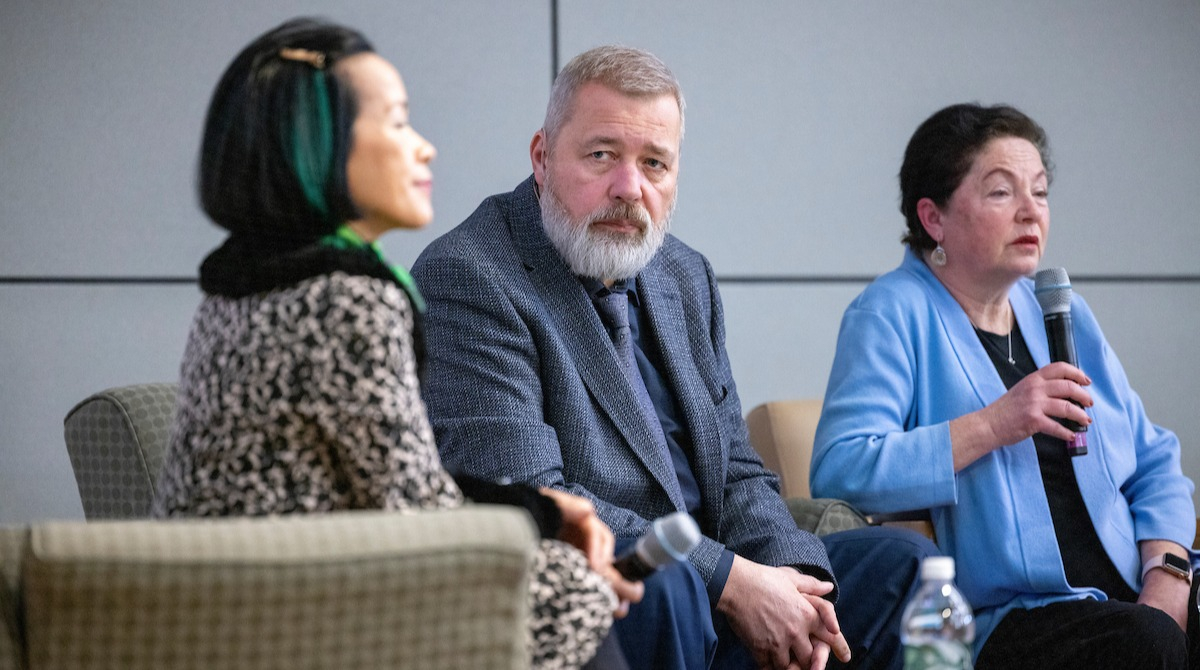The Utah Valley University (UVU) Center for Constitutional Studies (CCS) hosted Russian journalist and Nobel Peace Prize recipient Dmitry Muratov in a question-answer forum with UVU President Astrid S. Tuminez in the Clarke Building auditorium.

On the one-year anniversary of Russia’s invasion of Ukraine, a conflict that has displaced millions of Ukrainians and claimed the lives of thousands of civilians, the Utah Valley University (UVU) Center for Constitutional Studies (CCS) hosted Russian journalist and Nobel Peace Prize recipient Dmitry Muratov in a question-answer forum with UVU President Astrid S. Tuminez in the Clarke Building auditorium.
In the course of his remarks, Muratov, with the aid of a translator, spoke on Novaya Gazeta, a pro-democracy newspaper he co-founded; the murder of Russian journalists; the values of a free press; propaganda, dictatorship and corruption; and the Russian invasion of Ukraine.
“I am very concerned when I hear words about my own courage and courage of my colleagues,” he began. “I think that the biggest courage of the day is the courage of those people in Ukraine or those children who are suffering, and that is the reality of today.”
Muratov was awarded the 2021 Nobel Peace Prize with Novaya Gazeta co-founder Maria Ressa. He chose to auction his award medal for $103.5 million, which he then donated to UNICEF for the benefit of refugees from Ukraine.
“It’s too early to applaud,” he said. “These kind of auctions have to go on constantly because there is a great need, and we all have something we can share to help ease the suffering in Ukraine. This should be a chain of good deeds.”
On the 2006 murder of Russian journalist Anna Politkovskaya, a columnist for Novaya Gazeta, Muratov spoke on authoritarian governments’ need for silence — and the ultimate price for that silence.
“The foundation of each dictatorship is corruption,” he said. “Corruption needs to cancel democracy so the government will not be changeable. If a government isn’t changeable, that leads to dictatorship, and dictatorship always leads to war. A free media is really a requirement for no war, and free media was destroyed. Three hundred independent media organizations have been closed. Five hundred journalists have been declared as enemies of the state.”
When President Tuminez asked if he was concerned for his own safety, Muratov said that he would be saying the same things he would be saying now if he were in Moscow.
“I don't have a special version of my speech for export,” Muratov said. “In Moscow, we cannot talk openly about the events in Ukraine. You cannot name these events ‘the war.’”
In spite of all the challenges facing the world today, Muratov said he sees hope in younger generations.
“My main hope is in the new generation, which wants to live, which wants education,” he said. “I believe that people have compassion, and they’re not going to say, ‘This war is not in our continent, it’s not our war.’ They will see it differently. I believe an anti-war movement will force politicians to strive for peace.”
At the close of his remarks, Muratov strongly advised listeners to study propaganda and its effects on manipulating people.
“Propaganda is like radiation. It affects everyone and you need to know how to deal with it,” he said.
Muratov co-founded Novaya Gazetain 1991; the publication became a vocal advocate for free expression and democracy in Russia. In 2022, the Russian agency for censoring mass media canceled Novaya Gazeta’s media license, making it no longer available in Russia.